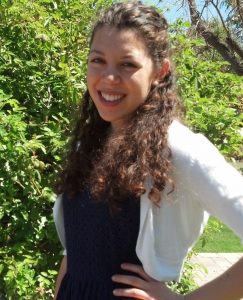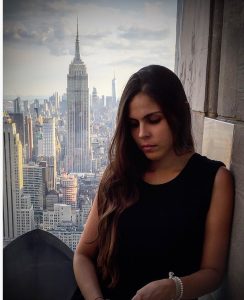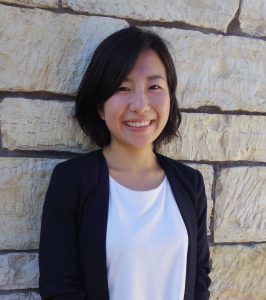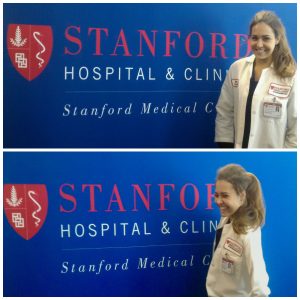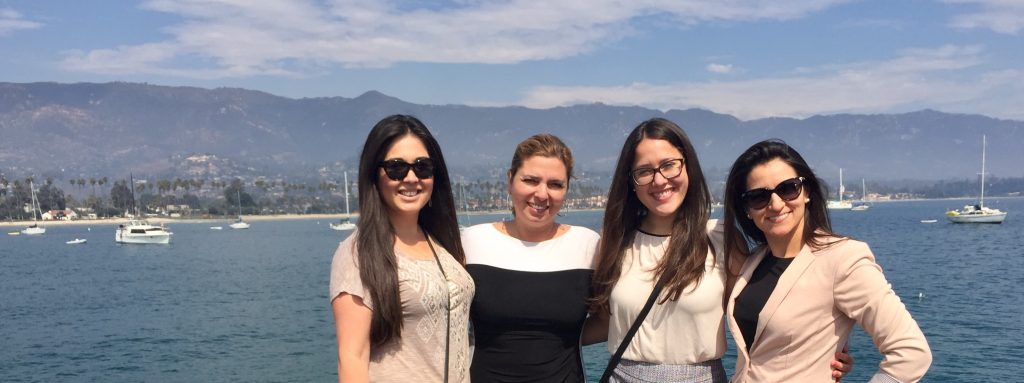
One of the benefits of my job as a Career Advisor is that I can learn through the exciting and interesting work that MIIS alumni and students do. Even though I have been in the language industry for 20+ years, I knew very little about interpreting in the educational setting. That is why I jumped on the opportunity to learn more from Anelix Diaz (MATI ’16). Anelix has always impressed me as an intelligent and diligent professional. Working with her through her job search and now listening to her reflection, what stands out for me is how level-headed she was in an uncertain time. Her passion for the profession and her sincerity in sharing her learnings also come through so clearly in the following interview. Bravo, Anelix! So proud of you!
Q: Please tell us about yourself.
A: I am Puerto Rican, though I was born in Oklahoma (yes, odd combination). Since junior high I have known that I wanted to be an interpreter, which is why I chose to study Modern Languages (French and German) at the University of Puerto Rico. Upon graduating, I took a year off to dedicate time to some important decisions I needed to make in my life, such as considering graduate schools and deciding what the next step was. That time also served me well in terms of gaining practical professional experience in the fields of interpreting and translating prior to pursuing a Master’s degree at MIIS. Last May I graduated from the Institute with a M.A. in Translation and Interpretation. I always like to challenge myself, which is why my current position as a District Translator and Interpreter for Special Education at the Santa Barbara Unified School District is such a good fit.
Q: What is your typical day like?
A: Every day is different. I arrive and check both my email and calendar to see if there are events taking place that day and if interpretation services are needed. Then, I start working on pending translations, which are mostly Individualized Education Plans (IEPs), but they can also be Individualized Health Care Plans, handbooks or Board Meeting Agendas, among other document types. In sum, I would say that 80% of my job is translating and 20% is interpreting.
As for interpretation, we interpret at IEP meetings for high profile cases. Since I work in the Special Education Department, I have access to the Special Education Information System. That is where I can look up students’ IEP by name, school, etc. If I have time, I review the student’s current IEP to familiarize myself with background information and better prepare for the meeting. The Student Attendance Review Board also requires our services at biweekly meetings with parents and students. If the student is in Special Education, I interpret simultaneously using our portable equipment. Otherwise, my coworker, who works for the General Education Department, interprets. There are also many opportunities to work overtime if you choose to do so. Since my job mostly involves translating, I like to take advantage of them to continue honing my interpretation skills. It also gives you a chance to learn about what’s happening at the school sites, where the district is heading, and to meet teachers, psychologists, paraeducators, etc. from those sites.
Q: Why did you choose to enter this field?
A: The first time I considered the possibility of working for a school district was after a workshop I attended at the 2015 ATA Conference and after I met two extraordinary women at the conference, who are now my coworkers. Those last few months in Monterey were hard for me. I was at a point in my life where I needed to be honest with myself about how and where I wanted to apply the skills I acquired at MIIS. I sat down and reflected on my personal and professional goals. I loved the idea of working as a conference interpreter on the East Coast, but I wasn’t sure whether that was what I truly wanted and if it would make me happy. I knew it would be easier to start out in California, since I was already living here. I needed a job that would not only be rewarding and exciting, but also one that allowed me to afford living in this state. Finding a job where there could be a balance between translation and interpretation was key as well. I had received an offer from a translation agency in Santa Barbara to work mostly as a project manager, but I wasn’t convinced, for many reasons. I was, however, already very interested in working in the education field and serving both families and students. I always like to challenge myself and broaden my horizons. So I searched on Zocalo, Google and LinkedIn and applied for several school districts. Unfortunately, when I saw the pay I knew it wasn’t enough to afford living here. Shortly thereafter, I became aware that the Santa Barbara Unified School District was looking for a District Translator and Interpreter for Special Education. I was initially hesitant, thinking I wouldn’t land the job because so many people would apply and I had no experience whatsoever interpreting in that field. I still decided to go for it and just hoped for the best. The job description and the fact that there were opportunities for professional development appealed to me. The pay was also good. And, let’s be honest, who wouldn’t want to live in beautiful, sunny Santa Barbara? I was shocked when I found out I had landed the job. I was truly grateful for the fact that I was given the opportunity to show what I could bring to the table.
Q: How did your education at MIIS prepare you for your current position?
A: MIIS not only provided me with solid research, translation, and consecutive and simultaneous interpretation skills, but also opened the door to endless opportunities for professional growth. Thanks to MIIS, I’ve met an extraordinary network of people from different backgrounds, perspectives, and languages. I learned so much about others, including myself. I continue to set the same high standards my professors set when I was a student. Complacency and I don’t get along well. I always look for ways to continue improving and growing professionally.
Q: For those interested in entering your field, how do you recommend that they prepare themselves?
A: Interpreting skills are undoubtedly important. However, it goes far beyond that. It’s about making quick decisions and using your best judgment during tense, sometimes awkward moments when interpreting. If you do choose to work in this field, keep in mind that most of the cases you will encounter are emotionally taxing. I never thought they would affect me personally. Just last week, I was at a meeting with my coworker, who was to interpret. After the student attendance panel reviewed a student’s case, I felt awful and was about to cry. I told my coworker I needed to leave immediately because I couldn’t take it anymore. So if you’re very, very emotional, then you might want to think twice. With regard to skills, I highly recommend students continue practicing interpretation using portable equipment, both indoors and outdoors. We don’t have booths. There are times when our job gets challenging because we can’t hear well and have to adjust accordingly.
Q: What is it that you know now that you wish you knew as you started your job search 6 months ago?
A: I’ve always been realistic and I knew since the beginning that looking for the right job wasn’t going to be an easy task. I knew I had to be flexible and open. I was also aware that I had to be patient when waiting for employers to respond. I would say that I regret not taking Holly Mikkelson’s community and medical interpreting courses. You would think that all the material you translate and interpret is only about “education.” Well, it just so happens that we do a little bit of everything. One day you could be translating a legal document and the next day you might be working with technical medical terminology. Therefore, my recommendation for all students is to learn about everything they can, no matter how insignificant it might seem at first. You never know when you will need the knowledge.
–Winnie Heh
Career & Academic Advisor
wheh@miis.edu
